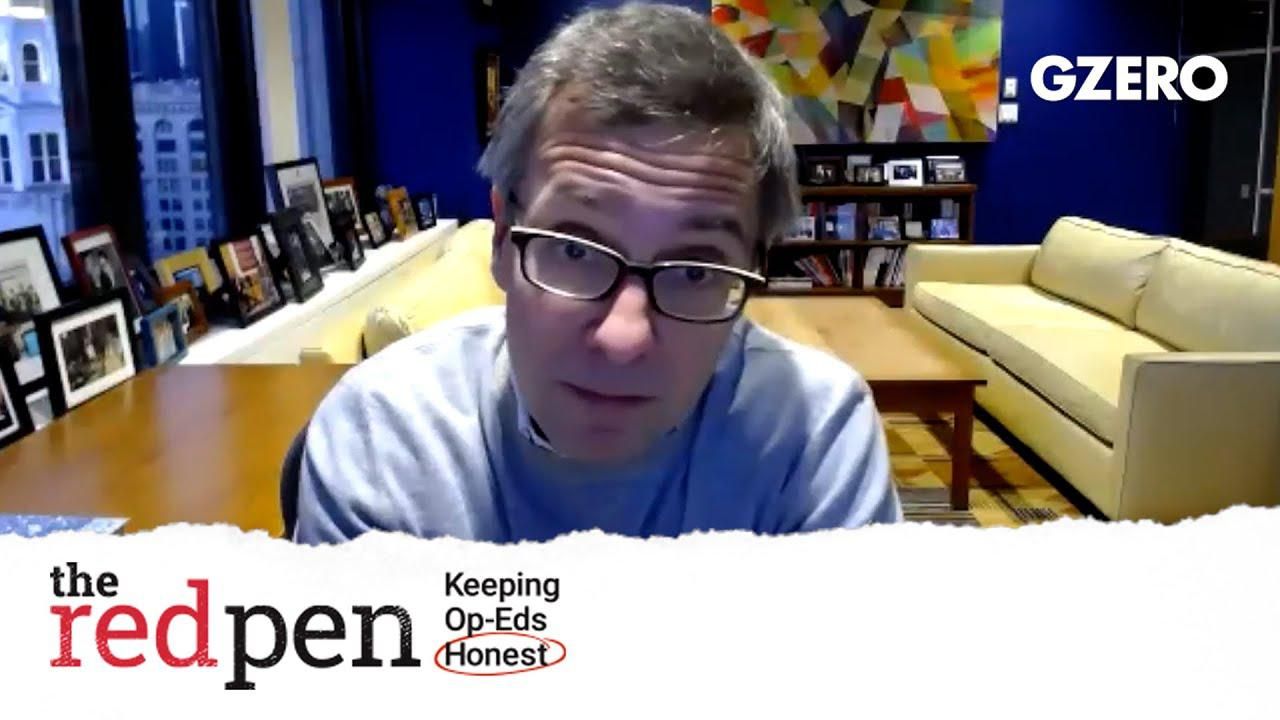The Red Pen
America is still a democracy post-Trump, but is it a healthy one?

America is Still a Democracy Post-Trump, But is it a Healthy One? | The Red Pen | GZERO Media

Ian Bremmer and Eurasia Group's Jon Lieber, Jeffrey Wright, and Clayton Allen are taking the Red Pen to an op-ed by Eric Posner, an author and law professor at the University of Chicago. It's titled "America Passed the Trump Stress Test" and was published recently by Project Syndicate.
Professor Posner's argument is basically this: sure, President Trump has violated norms and challenged legitimate election results, but in the end, no real harm done to American institutions, or America's democracy itself. Now it's certainly true that Trump's behavior hasn't led to meaningful policy change, but Posner is blowing the whole thing off as a, "Nothing to see here, no big deal," moment. And we think it's a bit more serious than that.First, Posner writes, "While many Republican voters tell pollsters that the election was stolen, hardly any of them have taken to the streets or pursued tactics that one would expect from people who truly believe that democracy has been subverted. There has been no Hong Kong style uprising. Trump's attacks on American institutions are largely a form of political performance art."
Okay. For starters, it is obvious that the US democracy has withstood Trump's challenge of the election results, and refusal to concede. Heck, that's my whole, "Don't panic," shtick, but that's a low bar. Trump has also in the process, reshaped the Republican party and accelerated the deep partisanship that has nearly destroyed the possibility of compromise in Washington. You do actually need legislation to get done in a country. Further, Trump isn't going anywhere. I mean, we'll see how Twitter treats him in his days, post Pennsylvania Avenue, when we all know he's still going to be tweeting, and he's still going to be talking to his base.
Next, on the matter of civic discourse and participation throughout the election, Posner writes, "Despite the hardships and constraints of the worst health crisis in a century, people donated money to candidates, argued with each other online, organized on a massive scale, notwithstanding the conspiracy theorizing, polarization, and persistent sense of turmoil. These are signs of a healthy democracy."
May I remind you, Eric, that a majority of Trump voters don't think that Biden legitimately won, and the voting system was seriously stretched; hours long waits, mail-in ballot hiccups and the like. Look, America is surely a democracy, but saying that the American democracy is healthy? Most Americans don't think so, most foreigners too. That's a problem. I'd also point out that Trump's attacks on the legitimacy of the election have reinforced distrust in the system, particularly among his own 70 plus million supporters. That isn't the sign of a healthy democracy either.
Finally, Posner writes of Trump's hope of overturning the election results, "Perhaps," he says, "If enough voters took to the streets and enough officials calculated that a grateful Trump would award them with future Senate cures, these officials would have delivered for him, but that didn't happen."
Prime Minister Narendra Modi, with President of the European Council António Luís Santos da Costa, and President of the European Commission Ursula von der Leyen, at Hyderabad House, in New Delhi, India, on Jan. 27, 2026.
On Tuesday, the world’s largest single market and the world’s most populous country cinched a deal that will slash or reduce tariffs on the vast majority of the products they trade.
Canadian Prime Minister Mark Carney has repeatedly tussled with US President Donald Trump, whereas Mexican President Claudia Sheinbaum has tried to placate him. The discrepancy raises questions about the best way to approach the US leader.
10,000: The number of Hamas officers that the militant group reportedly wants to incorporate into the US-backed Palestinian administration for Gaza, in the form of a police force.
Walmart is investing $350 billion in US manufacturing. Over two-thirds of the products Walmart buys are made, grown, or assembled in America, like healthy dried fruit from The Ugly Co. The sustainable fruit is sourced directly from fourth-generation farmers in Farmersville, California, and delivered to your neighborhood Walmart shelves. Discover how Walmart's investment is supporting communities and fueling jobs across the nation.